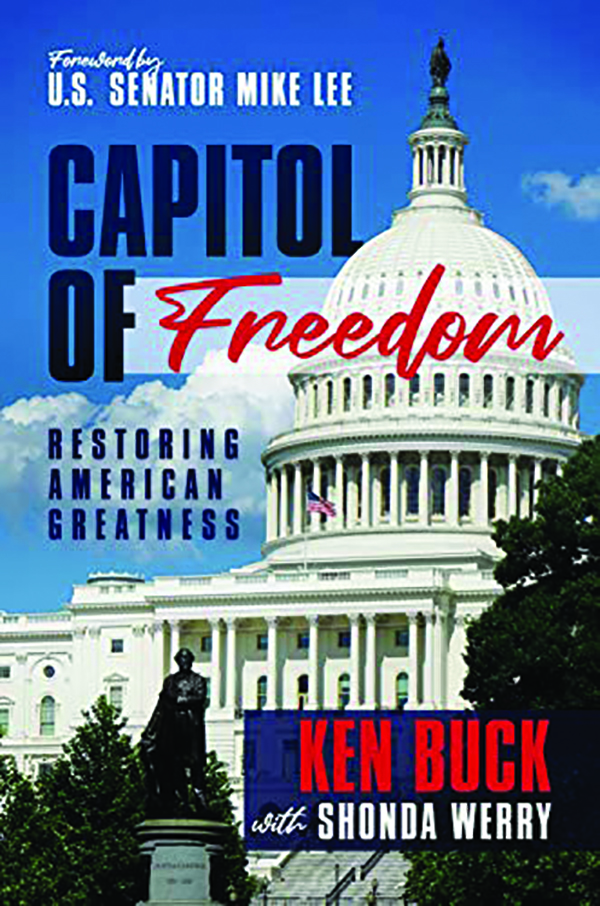As controversies about our history have come to the fore, two long-held propositions have been subjected to renewed scrutiny. One is that although our Founding Fathers were imperfect, they were in sum good men who, having led a revolutionary experiment in human freedom, still deserve to be memorialized. The other is that our nation’s founding was an honorable event that has benefited countless generations.
Rep. Ken Buck’s new book, Capitol of Freedom: Restoring American Greatness, is especially timely insofar as it reaffirms a commitment to both of those propositions. Who is worth memorializing, and which parts of our history are worth remembering, even revering? Buck’s response is, “All of it,” and all of it is represented in the U.S. Capitol building.

Buck uses the building itself to make his case. Each old feature or piece of art has some relation to a priority of the founding generation. The meaning of the statue of Lady Liberty, which holds the Constitution in its hand, is clear enough. Buck also cites less obvious examples: He uses the Magna Carta replica, located in the crypt, to explain the importance the founders put on the supremacy of law and the House chapel to deal with religious freedom.
In the old Supreme Court chamber, Buck romanticizes the high court before the “invention” of judicial review. Here, he makes some incongruous arguments. Much of his chapter on the court outlines instances of judicial overreach and questions the court’s evolved function as chief interpreter of the Constitution. “Mind you, the legislative branch could get something wrong, but go back and fix it if need be,” he writes. “But when the high court creates an entirely new right, it also creates a slew of unintended consequences the other branches of government will have to fix.”
Buck has little problem, however, with the numerous First and Second Amendment cases that have created more freedom rather than less. He writes glowingly of District of Columbia v. Heller and Burwell v. Hobby Lobby, both products of judicial review. For much of the book, Buck champions the legislature as the center of government, yet he writes approvingly of Justice Brett Kavanaugh, who “has demonstrated throughout his tenure as a judge a laser-like focus on scaling back the administrative state.” But shouldn’t scaling back the administrative state be the job of Congress?
Books on conservative principle often run into this problem. The modern conservative opposes the 20th-century expansion of the federal government and feels compelled to champion America’s original style of limited government as an alternative. But he can’t avoid appreciating when big government meets conservative needs. It’s not hypocrisy, but it certainly demonstrates that theoretical preferences are often in tension with practical ones.
At other times, the book’s tone is avowedly partisan. Buck takes on those who kneel for the anthem and relitigates impeachment, Russiagate, and even Benghazi. He praises Trump as a”disruptor.” And he assigns nearly all the blame for our current polarization to former President Barack Obama, writing that “the breakdown in discourse today, and the hateful rhetoric we see, even from members of Congress, can be traced to the [Saul] Alinsky tactics Obama popularized.”
But overall, the book has many positive offerings. Among the most compelling is its defense of federalism. For instance, Buck praises the Electoral College as “the last vestige” of truly republican government. Buck also uses federalism as the subtext for his entire critique of modern progressivism, or “collectivism,” which trusts the “hands of the government to solve our problems, to serve as the primary provider of charity.” It’s an argument for subsidiarity, for local and moral action. In other words, “The gross expansion of the federal government is immoral. There’s no other way to put it.”
Selecting the Capitol as the book’s main character certainly makes Buck’s argument fresh, and it adds weight to these words: “In republican government, the legislative authority necessarily predominates.” The legislature — not the president, not the courts — is at the center of our government. Buck is unequivocal about that.
Jeremy Beaman is a Washington Examiner commentary fellow.
